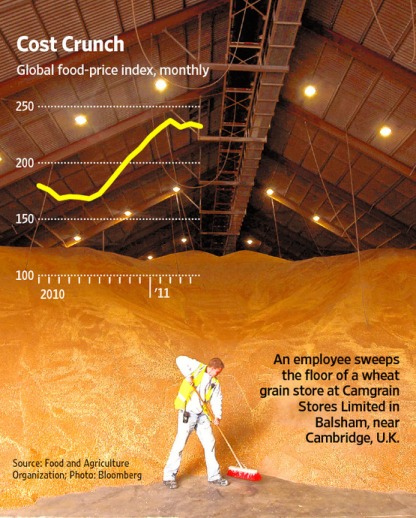Category: Global Economy Sub-category: World Economy
Document type: news
Growing world-wide food shortages has led the Australian trade minister Craig Emerson to suggest trade reforms to prevent a food crisis in the near future. According to him, civil strife in the Middle East was partly reason for acute gap in food availability. The International community was called upon to abolish trade restrictions and allow its most-efficient food producers, including Australia, to increase their productivity and production. Trade liberalisation, according to him, is the only solution for this expanding food shortage problem.
Given the geometric progression increase in population, the G20 summit in Paris, to discuss the UN forecasts, concluded that by 2050, food production must be increased by 70%. This was paradoxically contradicted to a fact also stated then, that agricultural productivity would drop by 1.7% p.a. till 2020. The steps considered for this purpose were creation of an international food-stock database, reduction of trade restrictions and the effect of speculation on food commodity prices through commodity-derivative markets.
The Australian Bureau of Agricultural and Resource Economics and Sciences illuminated the capacitance of the economy's agricultural sector to raise production for the purpose of exports by upgrading its predictions for the sector's export revenue in 2011-12 from $32.5 billion to a record $34.1billion.
According to commodities forecast reports of Australia, the crop exports are expected to rise 12.2 per cent to $19.4billion, while livestock exports will be constant at $14.7billion, partly due to the restriction of live cattle exports to Indonesia. Australia's total farm production is expected to rise by 2 per cent to a record $50.3billion in the coming year.
The economic logic involved in this conclusion as stated by Dr. Emerson was:
That means a greater amount of food at lower cost. That's the equation that countries worried about food security are looking for: quality and price. Specialisation through free trade in agricultural products enables both of those to be achieved - that is, greater quality at lower price.
This would lead to empowerment of farmers and a solution to fight the imminent food scarcity in the world. Dr Emerson said that the actual problem was the wide gap between the demand for food and the world's ability to produce under current trade regimes.

External Links:
The Food and Agriculture Organisation (popularly known as FAO) of the United Nations leads international efforts to defeat hunger. Serving both developed and developing countries, FAO acts as a neutral forum where all nations meet as equals to negotiate agreements and debate policy. FAO is also a source of knowledge and information. We help developing countries and countries in transition modernize and improve agriculture, forestry and fisheries practices and ensure good nutrition for all. Since our founding in 1945, we have focused special attention on developing rural areas, home to 70 percent of the world's poor and hungry people.
-









